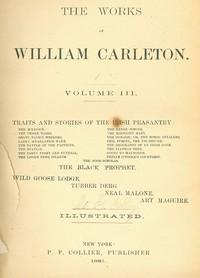|
|
Read this ebook for free! No credit card needed, absolutely nothing to pay.Words: 87707 in 18 pages
This is an ebook sharing website. You can read the uploaded ebooks for free here. No credit cards needed, nothing to pay. If you want to own a digital copy of the ebook, or want to read offline with your favorite ebook-reader, then you can choose to buy and download the ebook.

: The Atlantic Monthly Volume 12 No. 70 August 1863 A Magazine of Literature Art and Politics by Various - American periodicals The Atlantic Monthly@FreeBooksTue 06 Jun, 2023 THE ATLANTIC MONTHLY. A MAGAZINE OF LITERATURE, ART, AND POLITICS. Entered according to Act of Congress, in the year 1863, by TICKNOR AND FIELDS, in the Clerk's Office of the District Court of the District of Massachusetts. AN AMERICAN IN THE HOUSE OF LORDS. Having in a former number of this magazine attempted to give some account of the House of Commons, and to present some sketches of its leading members, I now design to introduce my readers to the House of Lords. It is obviously unnecessary to repeat so much of the previous description as applies to the general external and internal appearance of the New Palace of Westminster. It only remains to speak of the hall devoted to the sessions of the House of Lords. And certainly it is an apartment deserving a more extended notice than our limits will allow. As the finest specimen of Gothic civil architecture in the world, perfect in its proportions, beautiful and appropriate in its decorations, the frescoes perpetuating some of the most striking scenes in English history, the stained glass windows representing the Kings and Queens of the United Kingdom from the accession of William the Conqueror down to the present reign, the niches filled with effigies of the Barons who wrested Magna Charta from King John, the ceiling glowing with gold and colors presenting different national symbols and devices in most elaborate workmanship and admirable intricacy of design, it is undeniably worthy of the high purpose to which it is dedicated. The House of Lords also contains the throne occupied by the reigning sovereign at the opening and prorogation of Parliament. Perhaps its more appropriate designation would be a State-Chair. In general form and outline it is substantially similar to the chairs in which the sovereigns of England have for centuries been accustomed to sit at their coronations. We need hardly add that no expense has been spared to give to the throne such intrinsic value, and to adorn it with such emblems of national significance, as to furnish renewed evidence of England's unwavering loyalty to the reigning house. The House of Lords is composed of lords spiritual and lords temporal. As this body is now constituted, the lords spiritual are two archbishops, twenty-four bishops, and four Irish representative prelates. The lords temporal are three peers of the blood royal, twenty dukes, nineteen marquises, one hundred and ten earls, twenty-two viscounts, two hundred and ten barons, sixteen Scotch representative peers, and twenty-eight Irish representative peers. There are twenty-three Scotch peers and eighty-five Irish peers who have no seats in Parliament. The representative peers for Scotland are elected for every Parliament, while the representative peers for Ireland are elected for life. As has been already intimated, this enumeration applies only to the present House of Lords, which comprises four hundred and fifty-eight members,--an increase of about thirty noblemen in as many years. The persons selected from time to time for the honor of the peerage are members of families already among the nobility, eminent barristers, military and naval commanders who have distinguished themselves in the service, and occasionally persons of controlling and acknowledged importance in commercial life. Lord Macaulay is the first instance in which this high compliment has been conferred for literary merit; and it was well understood, when the great essayist and historian was ennobled, that the exception in his favor was mainly due to the fact that he was unmarried. With his untimely death the title became extinct. Lord Overstone, formerly Mr. Loyd, and a prominent member of the banking firm of Jones, Loyd, and Co. of London, elevated to the peerage in 1850, is without heirs apparent or presumptive, and there is good reason to believe that this circumstance had a material bearing upon his well-deserved promotion. But these infrequent exceptions, these rare concessions so ungraciously made, only prove the rigor of the rule. Practically, to all but members of noble families, and men distinguished for military, naval, or political services, or eminent lawyers or clergymen, the House of Lords is unattainable. Brown may reach the highest range of artistic excellence, he may achieve world-wide fame as an architect, his canvas may glow with the marvellous coloring of Titian or repeat the rare and delicate grace of Correggio, the triumphs of his chisel may reflect honor upon England and his age; the inventive genius of Jones, painfully elaborating, through long and suffering years of obscure poverty, the crude conceptions of his boyhood, may confer inestimable benefits upon his race; the scientific discoveries of Robinson may add incalculable wealth to the resources of his nation: but let them not dream of any other nobility than that conferred by Nature; let them be content to live and die plain, untitled Brown, Jones, and Robinson, or at best look forward only to the barren honors of knighthood. Indeed, it is not too much to say that for plebeian merit the only available avenues to the peerage are the Church and the Bar. The proportion of law lords now in the House of Lords is unusually large,--there being, besides Lord Westbury, the present Lord-High-Chancellor, no fewer than six Ex-Lord-Chancellors, each enjoying the very satisfactory pension of five thousand pounds per annum. Lord Lyndhurst still survives at the ripe age of ninety-one; and Lord Brougham, now in his eighty-sixth year, has made good his promise that he would outlive Lord Campbell, and spare his friends the pain of seeing his biography added to the lives of the Lord-Chancellors to whom, in Lord Brougham's opinion, Lord Campbell had done such inadequate justice. The course of proceeding in the House of Lords differs considerably from that pursued in the House of Commons. The Lord-High-Chancellor, seated on the wool-sack,--a crimson cushion, innocent of any support to the back, and by no means suggestive of comfort, or inviting deliberations of the peers, but is never addressed by the speakers. "My lords" is the phrase with which every peer commences his remarks. Another peculiarity patent to the stranger is the small number usually present at the debates. The average attendance is less than fifty, and often one sees only fifteen or twenty peers in their seats. Two or three leading members of the Ministry, as many prominent members of the opposition, a bishop or two, a score of deluded, but well-meaning gentlemen, who obstinately adhere to the unfashionable notion, that, where great political powers are enjoyed, there are certain serious duties to the public closely connected therewith, a few prosy and pompous peers who believe that their constant presence is essential to the welfare and prosperity of the kingdom,--such, I think, is a correct classification of the ordinary attendance of noblemen at the House of Lords. Free books android app tbrJar TBR JAR Read Free books online gutenberg More posts by @FreeBooks
: The Black Prophet: A Tale Of Irish Famine Traits And Stories Of The Irish Peasantry The Works of William Carleton Volume Three by Carleton William Flanery M L Illustrator - Ireland Social life and customs Fiction@FreeBooksTue 06 Jun, 2023

: The Poor Scholar Traits And Stories Of The Irish Peasantry The Works of William Carleton Volume Three by Carleton William Flanery M L Illustrator - Ireland Social life and customs Fiction@FreeBooksTue 06 Jun, 2023
|
Terms of Use Stock Market News! © gutenberg.org.in2025 All Rights reserved.






